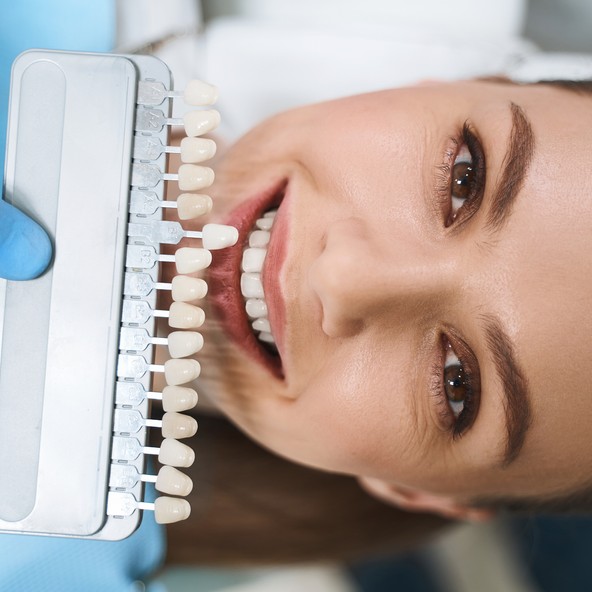Dental Veneers


Cosmetic Porcelain Veneers
Porcelain veneers are widely considered as the simplest and most aesthetically pleasing method of enhancing your smile and making it more visually appealing, as well as giving you healthier teeth and gums. Porcelain veneers are popular due to their natural effect and remarkable effectiveness in whitening dark yellow teeth and tetracycline teeth stains. As such, porcelain veneers are often referred to as “instant braces” due to the ease and simplicity in which they make teeth look straighter and whiter.
Cosmetic Porcelain Veneers
Porcelain veneers are widely considered as the simplest and most aesthetically pleasing method of enhancing your smile and making it more visually appealing, as well as giving you healthier teeth and gums. Porcelain veneers are popular due to their natural effect and remarkable effectiveness in whitening dark yellow teeth and tetracycline teeth stains. As such, porcelain veneers are often referred to as “instant braces” due to the ease and simplicity in which they make teeth look straighter and whiter.
In its simplest definition, a porcelain veneer is a very thin shell of porcelain crafted to fit your teeth perfectly. The heat-treated porcelain veneers are bonded to the teeth, yet have no effect on day-to-day activities, such as eating, flossing and brushing. In addition, veneers are fabricated to last for years, making them a wise cosmetic dental solution to choose. It is not unheard of for veneers to last for decades, looking better than natural teeth as the years go by.
The process of installing porcelain veneers involves a .5-millimeter tooth reduction, making it highly minimally invasive when compared to the typical installation of a crown. Depending on the skills of your dentist, your dental veneers can be made to alter your tooth position, color, size and shape. Despite the large number of alternatives for restoring aesthetic teeth abnormalities, porcelain veneers yield some of the amazing results when chosen and done correctly.
Before you decide to have porcelain veneers installed, here are some facts to help you make an informed decision.
- Due to the fact that veneers require a tooth reduction of approximately .5 millimeters, this cosmetic treatment is considered permanent and non-reversible. Therefore, it pays to give your decision careful thought.
- The process of attaching porcelain veneers is minimally invasive and often requires no use of any local anesthetic. Patients however, could request that a local anesthetic be used if they are sensitive to dental work and have a propensity for having anxiety attacks during trips to the dentist.
- Fabrication time for porcelain veneers takes roughly around 7 days, depending on the type of cosmetic work that needs to be made.
- During your second visit, the porcelain laminate will then be inserted into the tooth. Once again, patients have the choice of undergoing this procedure with or without using local anesthetic. Due to the complexity of the insertion process, this visit usually takes longer than the initial visit.
- The removal of enamel, which naturally covers the tooth, can lead to sensitivity effects to heat and cold. This is a normal occurrence between your visit for teeth reduction and insertion of the veneer. Once the porcelain veneer has been installed, any sensitivity should eventually disappear.
- Although incredibly strong and durable, porcelain veneers have poor tensile performance. To prolong the life of your veneers, avoid activities that may cause the laminate to twist. These include prying pistachio nuts open with your teeth, chewing on bones, chewing on ice, biting fingernails and more. Taking care of your porcelain veneers boils down to common sense, so stay smart.



